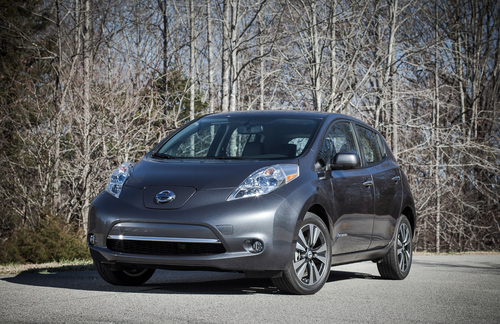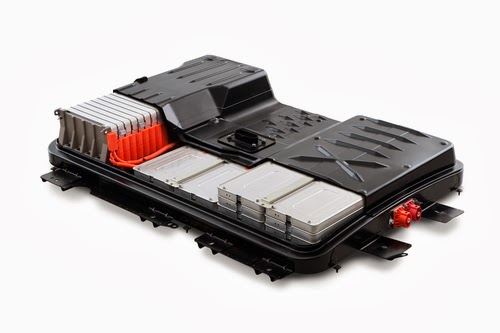Will Nissan launch, this year, a version of the Nissan Leaf that gives a 135 mile driving range? According to an article last week on TheStreet.com![]() , that’s exactly what Nissan will do, by this fall. Unfortunately the article offers no solid proof, just a pile of weak guesswork. However, one thing is certain, eventually it will be feasible for electric car makers to offer longer range faster charging electric cars. The key question is – when?
, that’s exactly what Nissan will do, by this fall. Unfortunately the article offers no solid proof, just a pile of weak guesswork. However, one thing is certain, eventually it will be feasible for electric car makers to offer longer range faster charging electric cars. The key question is – when?
Obviously an electric car with longer range and faster charging is desirable over one with short range and slow charging. This is about convenience and ensuring the car driving experience doesn’t degrade (too much) from what we have with gasoline cars. At the same time it is very much true that the average daily driving for Americans is less than 40 miles per day, so even a short range slow charging electric car can satisfy daily driving needs for most of us.
TheStreet points to two pieces of data. First, Nissan first talked about longer range electric cars in 2009. Second, Nissan has been sending surveys to Leaf owners asking them what price premium they’d be willing to pay for 135 miles of range. The suggested premium amount topped out at $5,000, according to discussions on the MyNissanLeaf forum.
That gives us a ballpark figure of $33,000 base MSRP for a 135 mile Leaf, and suggests some likelihood that Nissan is close to launching such a car. But that’s sheer guesswork, with nothing solid to back it up.
Over the weekend I’d seen some discussion, probably on MyNissanLeaf, saying that Nissan is close to releasing the “Hot Battery”. This battery is meant to address the premature capacity loss issue that have plagued some Leaf owners. The other electric auto makers have either active thermal management systems, or battery chemistries that don’t degrade in hot weather. Nissan unfortunately chose to not use a thermal management system, and chose a chemistry that degrades more quickly in hot climates, or under heavy usage patterns.
Unfortunately I didn’t save the link to that discussion. In August 2013, Green Car Reports![]() wrote that Nissan is testing batteries that can withstand use in hot climates. The testing had been disclosed to Phoenix area Leaf owners, and Nissan engineers claimed to have developed batteries which show degradation no different than Leaf’s operated in more moderate climates. A followup report on PlugInCars
wrote that Nissan is testing batteries that can withstand use in hot climates. The testing had been disclosed to Phoenix area Leaf owners, and Nissan engineers claimed to have developed batteries which show degradation no different than Leaf’s operated in more moderate climates. A followup report on PlugInCars![]() reported that Nissan would begin manufacturing these batteries in April 2014 – or right about now.
reported that Nissan would begin manufacturing these batteries in April 2014 – or right about now.
These reports also said that (some) current Leaf owners will be offered battery pack replacements at favorable terms.
If Nissan designed this properly, they will be able to offer a battery pack upgrade to any Leaf owner that gives better performance in hot weather.
But, what does this have to do with longer range? The discussion I’d looked at over the weekend (but didn’t save a link to it) claimed the chemistry changes in Nissan’s hot battery also increased energy density. Ergo, delivery of the Hot Battery could also satisfy the range increase suggested by TheStreet’s article.
Or, maybe not. According to a Green Car Reports![]() article in November 2013, Nissan was in the final round of testing the hot battery and was about to finalize the decisions over what to do with that battery. The most likely model will be that it’s a “running upgrade” to the existing Leaf, meaning that Nissan’s battery factories will simply switch chemistry one day and further Leaf’s will have the new chemistry. Further, the chemistry switch won’t increase energy capacity, and therefore wouldn’t give a range increase. Finally, the new packs could serve as battery replacements for Leaf owners with high degrees of capacity degradation.
article in November 2013, Nissan was in the final round of testing the hot battery and was about to finalize the decisions over what to do with that battery. The most likely model will be that it’s a “running upgrade” to the existing Leaf, meaning that Nissan’s battery factories will simply switch chemistry one day and further Leaf’s will have the new chemistry. Further, the chemistry switch won’t increase energy capacity, and therefore wouldn’t give a range increase. Finally, the new packs could serve as battery replacements for Leaf owners with high degrees of capacity degradation.
On the other hand, in September 2013 motoring.com.au![]() (Australia) had a discussion with Andy Palmer in which he said that improved range would happen “For sure within the current model cycle.” The Leaf was introduced in 2010, and has a six year model cycle, so if Palmer is correct then sometime before Fall 2016 we’ll see a Leaf range jump. The target is a 200 kilometer range, and Nissan is seeing battery chemistry improvements occurring more rapidly than expected.
(Australia) had a discussion with Andy Palmer in which he said that improved range would happen “For sure within the current model cycle.” The Leaf was introduced in 2010, and has a six year model cycle, so if Palmer is correct then sometime before Fall 2016 we’ll see a Leaf range jump. The target is a 200 kilometer range, and Nissan is seeing battery chemistry improvements occurring more rapidly than expected.
Why doesn’t Nissan just go with a larger battery pack as some other automakers are doing? (Tesla, etc) According to Palmer it has to do with weight, and they want to implement energy capacity improvements within the same packaging. “We can do 200km now,” Palmer explained. “But it’s a cost balance. You can go to bigger batteries, that is relatively easy, but the more interesting stuff is the changing of the chemistry to get more kiloWatt hours out of the same packaging space. That’s because every time you add cells you add weight and the battery on a LEAF is already 280kg. You want to get into a virtuous circle of similar weight and more energy density.”
- Highway design could decrease death and injury risk, if “we” chose smarter designs - March 28, 2015
- GM really did trademark “range anxiety”, only later to abandon that mark - March 25, 2015
- US Government releases new regulations on hydraulic fracturing, that some call “toothless” - March 20, 2015
- Tesla Motors magic pill to solve range anxiety doesn’t quite instill range confidence - March 19, 2015
- Update on Galena IL oil train – 21 cars involved, which were the supposedly safer CP1232 design - March 7, 2015
- Another oil bomb train – why are they shipping crude oil by train? – Symptoms of fossil fuel addiction - March 6, 2015
- Chevron relinquishes fracking in Romania, as part of broader pull-out from Eastern European fracking operations - February 22, 2015
- Answer anti- electric car articles with truth and pride – truth outshines all distortions - February 19, 2015
- Apple taking big risk on developing a car? Please, Apple, don’t go there! - February 16, 2015
- Toyota, Nissan, Honda working on Japanese fuel cell infrastructure for Japanese government - February 12, 2015

















